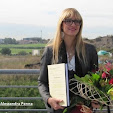Dear Maria,
Today I am writing to you from school. As you know I am in England, I'm beginning a new course of English.Most of the students in my class,like me, are starting this course for the first time ,but there are some others who fail the examination and come back year after year to start all over again.
While I'm writing to you , my English teacher is revising the Simple Present Tense and Present Continuos Tense.You Know I think she suspects I'm up to something because she casts a menacing glance in my direction every now and then.
A lot of students are arriving late today.This is very strange, because we all usually come on time.Our teacher is getting very angry; her face is getting redder and redder. We are always being told that the English are noted for their calm and self-control,but I feel that it's natural if she should lose her temper.
Of course, I don't spend all my time studing English. There are many things to see and there 's so much to do in London. In the afternoon, for example, I generally go window-shopping or to an art gallery or museum. In the evening we often get together and organise a party,or we go to see a film or a play.
Well, I must end now; the bell will be ringing in a few minutes' time.
Yours affectionately,
Cristina
1) The Simple Present Tense
The simple present tense is used:
a) for habitual actions. It is often accompanied by such frequency adverbs as: " always", "usually" "generally" etc.
I generally go to an art gallery in the afternoon
I usually come to school on time.
b) for actions which happen occasionally.It is often accompanied by such expressions as "occasionally", " from time to time", "sometimes", " every now and then",etc.
My teacher occasionally loses her temper.
c) for general truths:
Italians speak Italian
d) with future meaning after certain expression such as: "if", "unless","till", "untill", "when", "while", "as soon as", "as long as", "after", etc.
I shall see my friend if she comes tomorrow.
2.The Present Continuous Tense
The Present Continuos tense is used :
a) for actions actually happening NOW, at he time of speaking or writing :
(to be continued)

















0 commenti:
Posta un commento